News

As Vice President Kamala Harris and Minnesota Gov. Tim Walz continue to campaign across the country, pastors and organizers in Minnesota are reflecting on their work with the governor, saying that he has displayed an authentic willingness to collaborate with faith and community leaders over his tenure.
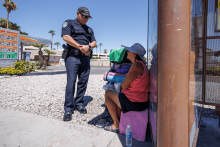
Palm Springs, Calif., long known as a desert playground for the rich and famous of Los Angeles, has enacted a number of progressive measures to address homelessness. Then in July, the all-Democratic city council passed a ban on sleeping on public property that will expand police authority to arrest the unhoused, underscoring how even liberal cities have lost patience as the homeless crisis persists.
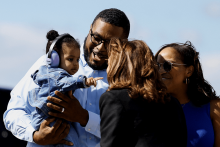
About a month into her presidential campaign, Vice President Kamala Harris has begun to reveal glimpses of her proposed White House policy agenda. The big-ticket items — child tax credits, housing incentives, and inflation relief on groceries — are aimed at the segment of the population most affected by the skyrocketing cost of living: young working families. It’s a focus child welfare advocates are welcoming.

“You do not want to be beholden to anything but God and your moral values,” Butler told Sojourners. “If I see the Democratic Party running astray from that, then I will criticize them. If they ever became a party of violence and mayhem and chaos, like the Republican Party has become, I would pray to God that I have the courage that so many ‘Never Trump’ Republicans have had. Stepping out in the crowd is an exceptionally hard thing to do.”
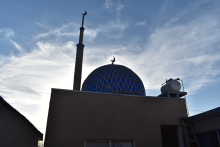
Anyone crossing the U.S.-Mexico border faces a journey fraught with violence and danger. But for women and children, that journey is even more treacherous. Not only are many fleeing violence at home — including gender-based violence — they also experience higher rates of violence en route. Torture, mutilation, sexual violence, femicide,disappearances, and additional health complications are common occurrences for female migrants making their way north.
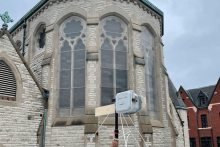
A couple years ago, urban farmer DeAndress Green drove Uber and DoorDash for 10 hours straight and then returned to her home on the southside of St. Louis struggling to breathe.
“I thought I was having an asthma attack,” she said.
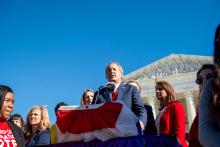
In the late spring of 1995, Rebekah Mitchell went into the hospital at 27 weeks pregnant with her second child. Mitchell had a kidney disease that was affecting her own health and the health of the baby. She made it to seven months, and then the baby, whom she and her husband had already named Jonathan, became entangled in the kinked umbilical cord, and died suddenly. Stunned and recovering from the cesarean section required to deliver Jonathan, she kept his body with her in the hospital room for three days.

Lawmakers in 29 states have proposed at least 91 bills promoting religion in public schools this year, according to Americans United for Separation of Church and State, an advocacy group backing a lawsuit challenging Louisiana's law. Rachel Laser, its chief executive, said the group tracked 49 similar bills in 2023.
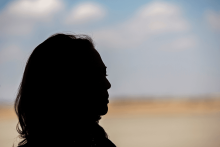
When President Joe Biden announced he would not seek reelection and Harris became the presumptive nominee, leaders in faith and immigration said that Harris brings a new outlook to the future of their work.
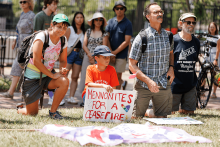
Starting on Thursday, July 18, between 35 and 125 Mennonites and interfaith allies from the U.S. and Canada made steady progress on their 11-day, 141-mile “All God’s Children March for a Ceasefire” trek from Harrisonburg, Va., to Washington, D.C. Upon arrival in Washington on Sunday, July 28, the marchers urged Congress and President Joe Biden’s administration to support an immediate, permanent ceasefire, the release of all hostages and political prisoners, an end to military aid to Israel, and a political solution that ends the occupation of Palestine, ensuring peace for Palestinians and Israelis. And on Tuesday, July 30, 46 of the people were arrested by Capitol Police during a protest.

It’s an overcast Saturday morning on Gladys Avenue in Skid Row — a 54-block area in downtown Los Angeles, home to one of the country’s most stable populations of people experiencing homelessness or housing insecurity. Andrew Jiang of Alhambra, a city in western Los Angeles County, is there with a group of around 15 other volunteers with the Friars and Sisters Poor of Jesus Christ to serve chicken, rice, and vegetables to some 150 people living on Skid Row. On other days, a team of friars, nuns, and volunteers will walk block to block, distributing up to 400 sandwiches to more than 200 people.
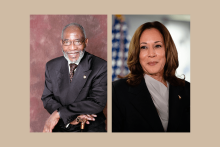
Then, after the service, Brown received a phone call from another member who was absent that Sunday: Vice President Kamala Harris, who was preparing to run a very different type of race.
“She said to me, ‘Pastor, I called because I want you to pray for me, [my husband] Doug, this country’ — and finally she said — ‘and the race I am intending to run for president,’” Brown told Sojourners on Monday. “We exchanged pleasantries, I congratulated her because she’ll be a great president, and we had prayer. She was so gracious and thankful that I took the time.”
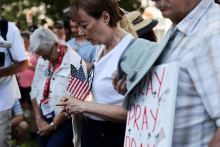
After former President Donald Trump was shot in the ear during a campaign rally on Saturday, faith leaders expressed their disavowal of political violence, reflections on how to reduce polarization, and a desire for other forms of violence to be taken seriously.
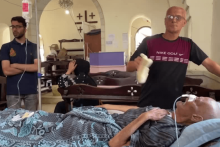
The Episcopal Church of Jerusalem and the Middle East protested the closure of Al-Ahli Arab Anglican Hospital in Gaza City as a result of the evacuation of several residential districts ordered by the Israeli military.
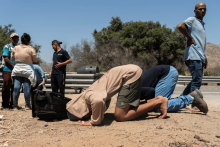
Dioulde and Jallo are two of 20 Mauritanians living in a space that used to be rented out for quinceañeras in the largely working-class area of southeast Los Angeles, where the population is 89.1 percent Latino. Now, in a space that families used to celebrate their daughters’ 15th birthdays under the sprinkling lights of a chandelier, there are rows of futon-style beds lined up against the walls, with folded Muslim prayer rugs, gallon-sized water bottles, and plastic sandals neatly stacked alongside.

The U.S. Supreme Court upheld on Friday anti-camping laws used by authorities in an Oregon city to stop homeless people from sleeping in public parks and public streets — a ruling that gives local and state governments a freer hand in confronting a national homelessness crisis.

Faith leaders have supported abortion rights since before 1973, but after Roe, even some theologically conservative denominations supported the ruling.

For years, Dietz Osborne and his colleagues at Miriam’s Promise adoption agency in Nashville, Tenn. had quietly worked with LGBTQ+ couples looking to adopt children. It was not something the United Methodist-affiliated agency advertised or promoted, but when a same-gender couple came to them, Miriam’s Promise unassumingly welcomed them as clients.

It was a simple wave that changed things for Frankie Leigh. Last summer’s Douglas County Pride festivities were wrapping up. It had been eight hours in near 90-degree heat, eight hours of picketers yelling at Leigh that they were going to hell. And just as the crowds were scattering, a protester called to Leigh. “See you next year!” Leigh couldn’t help but laugh. “It was that realization of like, I am going to see you every year,” Leigh said. “And I’ll probably see you in the grocery store and at the school board meeting and at these other places, too.”
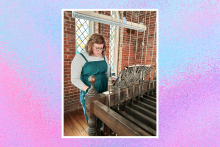
On June 1, for the North Carolina residents of downtown Durham, the morning’s new mercies came in the form of Chappell Roan’s song “HOT TO GO!” being played from the century-old bell tower of Duke Memorial United Methodist Church.